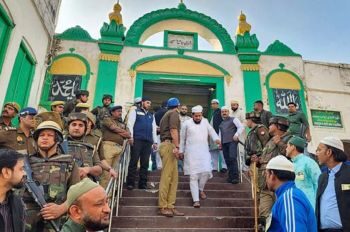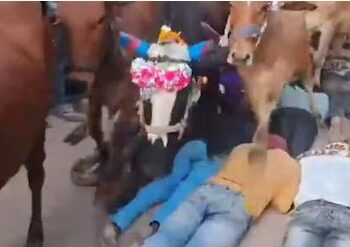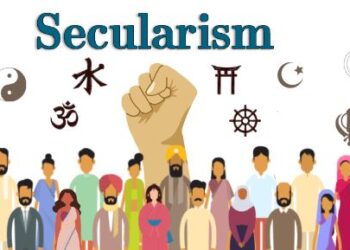nietzsche
Babasaheb Dr. B. R. Ambedkar was the Chairman of the Drafting Committee of Indian Constitution. Alladi Krishnaswamy was one among the members of the Committee. After the acceptance of the drafted Indian Constitution on November 29, 1949, its provisions came into effect from January 26, 1950.
The communal reservation, which was in force from the time of the ruling of Justice Party from the Madras Presidency in 1920s, was challenged in the Madras High Court in 1950. The writ petition was filed by Champakam Durairajan on the ground that she would not get admission to medical college due to the prospective discrimination as she belonged to Brahmin Community and that it was an infringement of the fundamental right ensured by the Constitution. The High Court decided the case in the petitioner’s favour by pronouncing the communal reservation invalid. The just begun dispensation of social justice to the historically disadvantaged due to the exploitation by the dominant cult in the Hindu society, was put on stake due to the verdict of the High Court.
The split up details of reservation as prevailed during the start of 1950s were as follows.
For every 14 seats to be filled by the selection committee, candidates used to be selected strictly on the following basis:
Non-Brahmin (Hindus) : 6, Backward Hindus : 2, Brahmins : 2, Harijans : 2, Anglo-Indian and Indian Christians : 1, Muslims : 1
Even though reservation was very much available to Brahmin Community, the challenge made by the Brahmin candidate, who did not apply for medical college admission at all, was considered in her favour. The verdict of the High Court put at stake the education and employment opportunities of major section of the oppressed in the society. The admission of writ petition could not be maintainable, usually, unless the petitioner got aggrieved as a result of any move on her side – in the present challenge, the petitioner should have applied for the Madras medical seat admission.
When the State Government appealed over the verdict of the Madras High Court, the Supreme Court also decided in the same line, upholding the invalidity of communal reservation as if it discriminated among the citizens. The main ground on which the judiciary held the communal reservation invalid was that no citizen can be discriminated against on the basis religion, race and caste. It was the infringement of fundamental right, which every citizen was entitled to avail.
However, the Supreme Court had taken cognizance of the candidate, in not having applied for medical admission but challenged it. The Supreme Court observed thus in its verdict.
“From the affidavit filed in support of her petition, it does not appear that the petitioner had actually applied for admission in the Medical College. She states that on inquiry she came to know that she would not be admitted to the College as she belonged to the Brahmin community. No objection, however, was taken to the maintainability of her petition on the ground of absence of any actual application for admission made by her. On the contrary, we have been told that the State had agreed to reserve a seat for her, should her application before the High Court succeed. In the peculiar circumstances, we do not consider it necessary to pursue this matter any further. But we desire to guard ourselves against being understood as holding that we approve of a person who has not actually applied for admission into an educational institution coming to Court complaining of infringement of any fundamental right under Article 29 (2)”.
-1951 AIR 226 SCR 525 of the State of Madras Vs Champakam Durairajan.
How did Dr. Ambedkar and Alladi Krishnaswamy Iyer act in respect of the challenge of the communal reservation and the verdict of the apex Court? Both of them held vital positions in the drafting committee, constituted for writing Indian constitution.
After having accomplished his role as member in the drafting committee, Alladi Krishnaswamy Iyer started to continue his profession of a lawyer. He was the advocate in the writ petition, challenging the communal reservation, both at Madras High Court and appellate apex court. Having known that the writ petitioner had not applied for medical seat admission, he should not have appeared at all on her behalf or else he could have explicitly mentioned the fact it in the affidavit. In course of arguments, the court came to know that the petitioner, Champakam Durairajan had not applied for it at all. It was exactly unethical on the part of Alladi to appear on behalf of the petitioner when she had not applied at all for the medical seat admission and would not have got aggrieved of. More than that, the reservation for the Brahmins was very much available at the time of filing the writ petition. Having remained at the helm of affairs in the drafting committee of the Constitution, Alladi either should not have appeared for as lawyer in the writ petition or must have been ethical in his performance at least. The role played by Alladi was purely communal to safeguard the interests of the monopoly of his own Brahmin Community.
Whereas, Dr. B.R. Ambedkar subtly offered his views thus on the verdict of the apex court:
“Turning to the Supreme Court judgment, which had invalidated the Communal Order of the Madras State Government on the ground that it involved discrimination between castes, Ambedkar remarked that “it was utterly unsatisfactory and was not in consonance with the Articles of the Constitution”. This remark created a storm in the House. When it died down, Ambedkar explained that the Supreme Court had overlooked the operative word “only” in Article 29 (2) – “No citizen shall be denied admission into any educational institution on grounds only of religion, race and caste.”
-Dr. Ambedkar Life and Mission by Dhananjay Keer (page: 430)
Having drafted the Indian constitution and being well versed with the provisions, Dr Ambedkar interpreted Article 29 (2), as discrimination on grounds of only of religion, rule and caste was void. The discrimination based on communal reservation was only compensatory and not on either of the ground of only of religion, race and caste. After having expressed his views Dr. Ambedkar explored the remedy through the Constitutional means by bringing amendment (insertion of Article 15 (4)) to it ensuring the continuance of communal reservation not only in the Madras State but guaranteed the communal reservation in the rest of the States. How ethical Dr. Ambedkar was despite having held the Chairmanship of Constitution Drafting Committee by upholding the Constitutional provisions and the judiciary with due respect!
Even though both Ambedkar and Alladi performed their roles in the drafting committee, they differed later in upholding the Indian Constitution and its values. The legal luminary in Dr. Ambedkar was different from the practice of Alladi Krishnaswamy Iyer which kept their personalities poles apart.
“Even though both Ambedkar and Alladi performed their roles in the drafting committee, they differed later in upholding the Indian Constitution and its values. The legal luminary in Dr. Ambedkar was different from the practice of Alladi Krishnaswamy Iyer which kept their personalities poles apart. “









